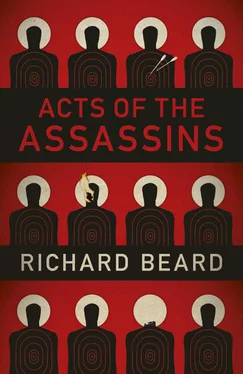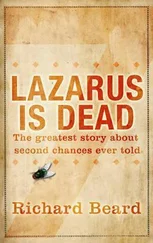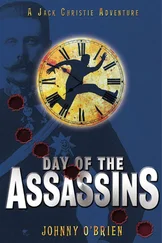In the kitchen a woman is peeling apples into a red plastic tub. She tells Gallio to keep going, as if he looks convincingly in need of spiritual help. In the living room at the end of the hall Paul is writing at a polished wooden desk. His bodyguard faces the door with arms crossed, not a threat but a barrier. Paul glances up, then squares a bundle of papers by blocking them against the leather inlaid desktop. He looks again at Gallio over the frames of his glasses.
‘Antioch,’ Gallio reminds him. ‘And the King David Hotel in Jerusalem. I’ve changed.’
Paul nods, takes off his glasses and puts them to one side. ‘Don’t like people to see me wearing them. Not the Paul my audience expects.’
The bodyguard is never far away as Paul gestures to a leather three-seater sofa he surely can’t afford. Gallio sits soft, and Paul takes the matching armchair, which is slightly higher. On the glass coffee table between them, a plate of wrapped sweets and a bowl of banknotes. Paul offers Gallio a sweet. Gallio checks the position of the bodyguard.
‘Don’t mind him. He won’t do anything unless you do.’
Gallio takes a sweet, unwraps, sucks. Ah, sugar. ‘You live well.’
‘I haven’t been convicted of a crime, and I’m a citizen. I have the right to appeal against false accusation without harassment. Are you here to harass me?’
‘If you hadn’t appealed you’d be free. After James was beaten to death you wanted us to arrest you for your own safety, but it seems like you weren’t in danger after all.’
Paul sighs, expressing the heavy burden of his knowledge of the world. Against his will he must inform Cassius Gallio, alas, that the world is largely unjust. ‘Now I’m here they can’t decide what I did wrong. I’m under arrest for breaching the Jerusalem peace, apparently, which sounds more convincing than conspiracy to make a dangerous phone call. What is it you want?’
Cassius Gallio remembers Paul as the centre of attention on the conference stage at Antioch. He did so enjoy his following, and Gallio can imagine Paul relishing the entertainment of his trial. They can’t convict a citizen without a triaI, and at his hearing he’ll persuade the judge and jury that belief in Jesus is a rational position to take, that black is white and death is the beginning not the end. He may be expecting applause.
‘You’ve done a fantastic job, Paul. First and foremost I came here to congratulate you. The Jesus believers appreciate your leadership, in which there’s so much to admire.’
Gallio makes a point of admiring the leather furniture in which they sit, the reflective finish of the coffee table, the rock-solid bodyguard. The disciples strive to live like Jesus and are difficult to imitate, problematic as role models. Far easier, now and always, to live like Paul. Not like Peter, in prison offering solace to the damned. Not like John, wherever he is, hunted and poor.
‘You’ve made a name for yourself at the centre of civilisation,’ Gallio says, ‘where none of your enemies dare touch you. Academics quote your letters and defer to your theology, even when they don’t agree.’
‘Please,’ Paul says. ‘I can’t take all the credit.’
Paul has a sophistication the disciples lack, which means Gallio isn’t certain what he’s thinking. Paul spreads his hands to mean he accepts Gallio’s flattery, or he doesn’t. ‘A greater power is at work. Now if you tell me what you want, I may be able to help.’
‘I need to set up a meet with John.’
‘You and everyone else. I don’t think you realise what you’re asking.’
‘He’s in Rome, isn’t he?’
Paul steeples his fingers, but the gesture is too studied, buying time. He uses the tips of his fingers as a sight, along which he aims a steady gaze into Gallio’s eyes. ‘You have to understand, John isn’t…’ Paul dissolves his steeple and taps his head. ‘He has suffered. Your people don’t know where John is and neither do I, because since the fire Rome has struggled to cope with the homeless, the raving, the unwashed. In this city one delirious voice praising angels sounds much like any other. The situation is very sad.’
‘Paul, you can trust me. I know your secret, and the secret of the disciples of Jesus.’
‘That’s a lot of secrets.’ Paul looks Gallio over, his ragged clothes and his rough-cut beard. ‘A lot of knowledge for a vagrant, or is it a deserter?’
Cassius Gallio senses that the time is now, and this is the only chance he’ll get. John is the last disciple he can save from death, even if he wants to die.
‘I came here straight from Addis Ababa,’ Gallio says, because he hasn’t forgotten how to lie. ‘My next mission is here in Rome, but with Peter facing public execution the CCU has to be careful about making contact with a high-profile Christian like you. That’s why they sent me to talk to you. No one in Rome remembers who I am.’
Paul’s gaze doesn’t waver. He brings back the steeple, and covers his nose.
‘Valeria sent me to ask about John,’ Gallio says, ‘because we’re reasonable men, Paul, you and I.’
Cassius Gallio has speculated every day in the boats from Patras to Rome, and again last night as he slept beneath the stars at the Abbey of the Three Fountains. If there is an explanation for his second failure as a Speculator, he has decided, this is where the unravelling starts: Paul is Valeria’s puppy, he is her little dog. Always has been.
Yes. All the way back in time to Damascus. Cassius Gallio has rearranged the pieces and now the picture is clearer. After his tribunal and his exile, Valeria had been promoted to the vacant senior Speculator post in Jerusalem. As an ambitious CCU operative she’d have liked the look of Paul, a home-grown killer, and Valeria could plausibly have planned to recruit Paul, luring him away from the Jews. Damascus was the opportunity, away from Jerusalem. Gather the information, assemble the pieces. Yes.
At the public library in Venice Gallio had looked up the area weather reports, and at the relevant time in that particular year a storm had pummelled the mountain ranges north of Israel. Paul with his entourage must have suffered, possibly hit by lightning. An opening. He arrived in Damascus dazed, blinded, and his recuperation provided perfect cover for negotiations behind closed doors, in which Valeria suggested an arrangement from which both stood to benefit. They put their heads together and devised the story of the miracle revelation, a brilliant invention that led to Paul’s acceptance by Jesus sympathisers everywhere.
Baruch had been right — Paul had a secret life. If Gallio had listened to Baruch more closely, and they’d uncovered Paul’s duplicity earlier, they could have undermined the Jesus belief. Now Gallio feels humbled but determined: Baruch was right about Paul, but he didn’t go far enough. Since Andrew, Gallio had seen the truth, and though he’s daunted by his fight against the what-will-be-will-be, he can out-speculate them all. Only Cassius Gallio understands that John must be denied his glorious martyrdom.
‘Paul, you told Valeria where the CCU could find the disciples,’ Gallio says. ‘Our map on the computer with the lights. You fed us information, and without you we wouldn’t have known where to start.’
‘Ingenious.’ Paul picks up a sweet, puts it down again. He looks at his watch, shakes it, holds the face against his ear. He unstraps his watch and places it on the table. ‘Interesting theory, except I haven’t helped the CCU find John. According to you I’ve turned in the others. I know everything about the disciples, then when it comes to John I suddenly know nothing.’
Paul has his own motivation for killing the disciples, over and beyond the leather furniture and free escorted travel to Rome. The disciples of Jesus inconvenience him. They’re his competition, so the quieter the disciples the stronger the voice of Paul, and one day Jesus will be whoever and whatever Paul decides he is in his letters and lectures. Valeria has helped Paul’s reputation to build, encouraging the public disagreements between him and Peter, trying to divide the enemy. She supplied Paul with centurions to feign conversion, and safe passage on his epic pedestrian treks. She once provided armed protection when he was threatened by Jewish militants. Paul is civilisation’s man.
Читать дальше












